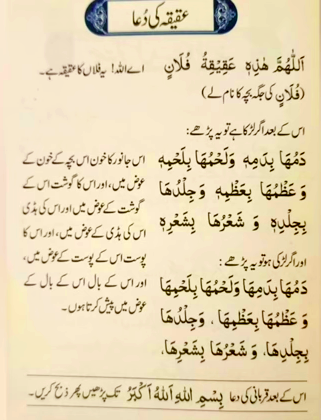Welcoming a newborn into the family is a momentous occasion marked by joy, gratitude, and spiritual reflection. In many Muslim cultures, this joyous event is beautifully celebrated through a religious ceremony known as Aqiqah. Central to this celebration is the recitation of Aqiqah ki Dua, a supplication that holds deep significance and connects the family to their faith. This blog post will guide you through the importance of Aqiqah ki Dua, its proper recitation, and its role in the Aqiqah ceremony.
Aqiqah ki Dua For Boy

Aqiqah ki Dua For Girl

What is Aqiqah?
Aqiqah is an Islamic tradition performed to celebrate the birth of a child. It typically involves the sacrifice of an animal, such as a sheep or goat, on the seventh day after the baby’s birth. This practice is not only a means of giving thanks to Allah for the blessing of a healthy child but also symbolizes the family’s commitment to raising the child in accordance with Islamic values.
Historical Background of Aqiqah
The practice of Aqiqah dates back to the time of Prophet Muhammad (PBUH). Historical records indicate that he performed Aqiqah for his grandsons, Hasan and Hussain. This act underscores the importance of Aqiqah in Islamic tradition and serves as a model for Muslim families to follow.
Spiritual Benefits of Aqiqah
Performing Aqiqah is believed to bring numerous spiritual benefits. It is an act of gratitude towards Allah and a means of seeking His blessings for the newborn. The ceremony also fosters a sense of community as family and friends gather to celebrate the new life and offer their prayers and well-wishes.
What is Aqiqah ki Dua?
Aqiqah ki Dua is a specific supplication recited during the Aqiqah ceremony. This dua seeks Allah’s protection and blessings for the child, ensuring that they grow up with a strong moral and spiritual foundation. The dua is a heartfelt plea to Allah, acknowledging His greatness and seeking His guidance in raising the child.
The Text of Aqiqah ki Dua

How to Recite Aqiqah ki Dua
Reciting Aqiqah ki Dua is a special moment that requires sincerity and devotion. Here are some steps to ensure the proper recitation:
- Preparation: Make sure you are in a state of wudu (ritual purity) before reciting the dua.
- Intention: Set a clear intention to seek Allah’s blessings and protection for your child.
- Pronunciation: Make an effort to pronounce the Arabic words correctly. If you are not fluent in Arabic, consider practicing with someone who is or listening to audio recordings for guidance.
- Focus: Recite the dua with full concentration and a humble heart, understanding the profound meaning behind the words.
Timing of Aqiqah ki Dua
The best time to perform Aqiqah and recite Aqiqah ki Dua is on the seventh day after the child’s birth. However, if this is not possible, the ceremony can be performed at a later date. The important thing is the intention and devotion behind the act, rather than the exact timing.
Role of Family and Community
Aqiqah is not just a personal act of worship; it is a communal event that involves family and friends. Inviting loved ones to share in the joy of the new addition to the family enhances the spiritual significance of the ceremony. It also provides an opportunity for the community to come together, offer their prayers, and support the new parents.
Incorporating Aqiqah ki Dua in Modern Times
In today’s fast-paced world, maintaining traditional practices can be challenging. However, the essence of Aqiqah and Aqiqah ki Dua remains timeless. Many families find creative ways to incorporate these traditions into their lives, whether through virtual gatherings, simplified ceremonies, or combining modern conveniences with age-old customs.
Common Misconceptions About Aqiqah
There are several misconceptions surrounding the practice of Aqiqah. For instance, some believe that it is compulsory, while others think it is purely cultural. It is important to note that Aqiqah is a strongly recommended Sunnah but not an obligatory act. The underlying principle is gratitude and devotion, not compulsion.
Health and Safety Considerations
When performing Aqiqah, it is crucial to ensure the health and safety of all participants, especially the animals being sacrificed. Proper hygiene and humane treatment of animals should be prioritized to align with Islamic teachings of compassion and respect for all living beings.
Impact of Aqiqah on the Child’s Life
The spiritual impact of Aqiqah extends beyond the ceremony itself. Reciting Aqiqah ki Dua and dedicating this act of worship to the child sets a positive tone for their upbringing. It instills a sense of faith and connection to the community from an early age, which can have lasting effects on their spiritual development.
Conclusion
Aqiqah ki Dua is more than just a supplication; it is a profound expression of faith, gratitude, and hope for the future. By understanding its significance and incorporating it into the Aqiqah ceremony, families can ensure that their child’s early days are blessed with divine protection and guidance.
If you are preparing for an Aqiqah ceremony and need further guidance, consider reaching out to religious scholars or community leaders who can provide personalized advice and support. May your Aqiqah be filled with joy, blessings, and the love of family and friends.
